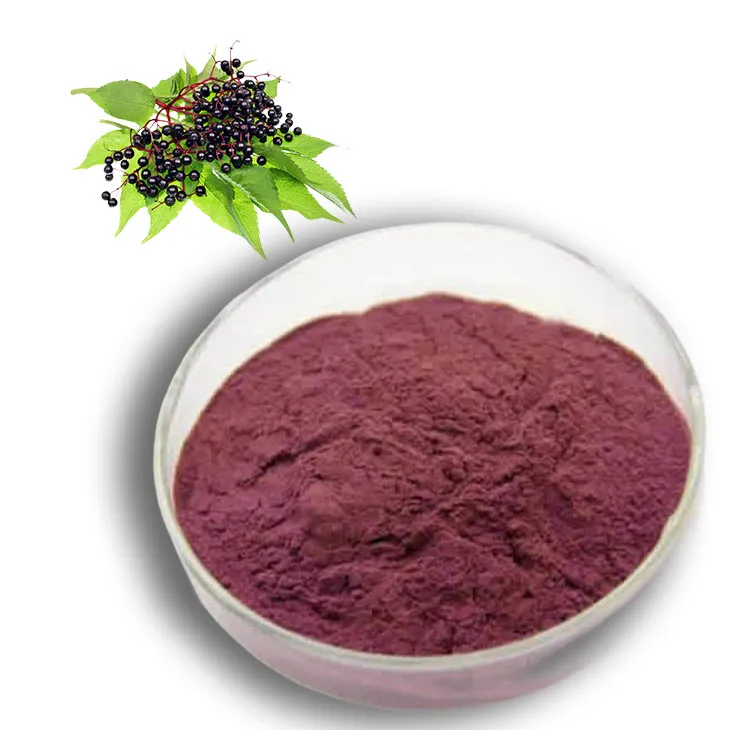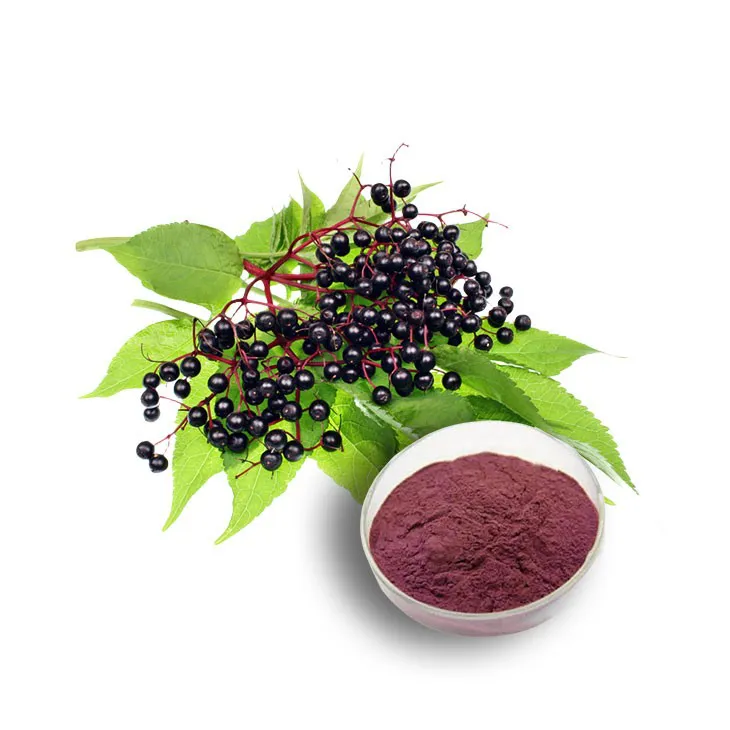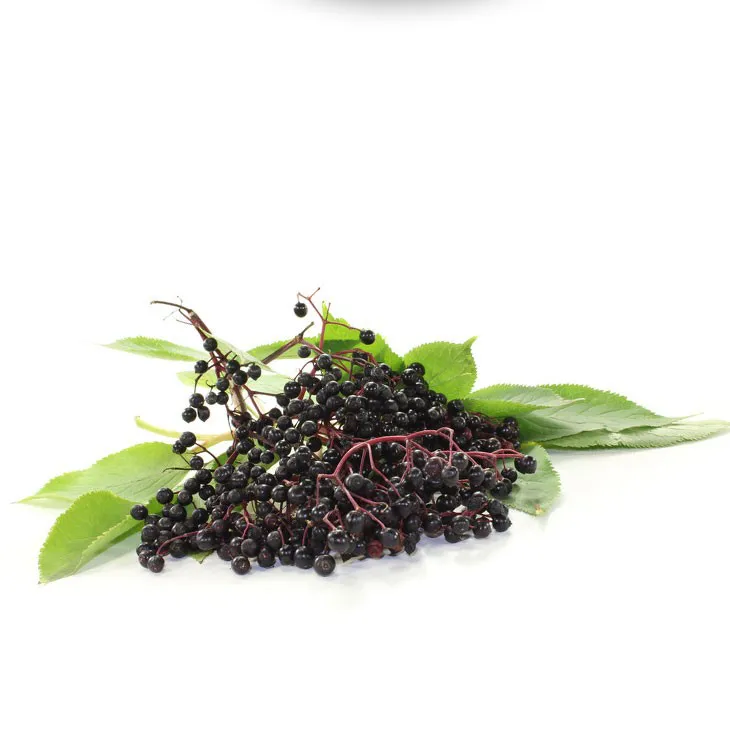- 0086-571-85302990
- sales@greenskybio.com
Is elderberry extract beneficial for diabetes? Are these all safe and suitable for diabetic patients?
2024-11-14

1. Introduction
Diabetes is a chronic metabolic disorder that affects millions of people worldwide. Management of diabetes often involves a combination of lifestyle modifications, medications, and dietary supplements. Elderberry Extract has been the subject of much research in recent years due to its potential health benefits. However, its role in diabetes management remains a topic of interest and debate. This article aims to explore the potential benefits of Elderberry Extract for diabetes, the possible mechanisms involved, and the safety considerations for diabetic patients.

2. What is Elderberry Extract?
Elderberry (Sambucus nigra) is a plant that has been used in traditional medicine for centuries. Elderberry extract is derived from the berries of this plant and contains a variety of bioactive compounds, including flavonoids, anthocyanins, and phenolic acids. These compounds are thought to be responsible for the potential health - promoting effects of elderberry extract.

3. Potential Benefits for Diabetes
3.1 Antioxidant Properties
One of the main potential benefits of elderberry extract for diabetes is its antioxidant properties. Antioxidants play an important role in diabetes management as they can help to reduce oxidative stress. Oxidative stress is increased in diabetic patients due to high blood glucose levels, which can lead to damage to cells and tissues. Elderberry extract contains high levels of flavonoids and anthocyanins, which are powerful antioxidants. These compounds can scavenge free radicals and protect cells from oxidative damage. A study has shown that elderberry extract can significantly increase antioxidant activity in vitro, suggesting that it may have a similar effect in vivo in diabetic patients.
3.2 Anti - inflammatory Effects
Chronic inflammation is another factor associated with diabetes. Inflammation can contribute to insulin resistance, which is a key feature of type 2 diabetes. Elderberry extract has been shown to have anti - inflammatory effects in several studies. The bioactive compounds in elderberry extract can inhibit the production of inflammatory cytokines, such as interleukin - 6 and tumor necrosis factor - alpha. By reducing inflammation, elderberry extract may help to improve insulin sensitivity in diabetic patients.
3.3 Blood Glucose Regulation
Some research suggests that elderberry extract may also play a role in blood glucose regulation. In animal studies, elderberry extract has been shown to lower blood glucose levels. The possible mechanisms involved include increasing insulin secretion, improving glucose uptake by cells, and inhibiting carbohydrate - digesting enzymes. However, more research is needed to confirm these effects in human diabetic patients.

4. Possible Mechanisms
4.1 Interaction with Insulin Signaling Pathways
Elderberry extract may interact with insulin signaling pathways to improve insulin sensitivity. Insulin signaling is crucial for the regulation of blood glucose levels. The bioactive compounds in elderberry extract may activate key proteins in the insulin signaling pathway, such as Akt and IRS - 1. By enhancing insulin signaling, elderberry extract can help cells to respond better to insulin and take up glucose more efficiently.
4.2 Modulation of Gut Microbiota
Recent research has highlighted the importance of gut microbiota in diabetes. Elderberry extract may modulate the gut microbiota, which in turn can affect blood glucose regulation. The bioactive compounds in elderberry extract can act as prebiotics, promoting the growth of beneficial bacteria in the gut. These beneficial bacteria can produce short - chain fatty acids, which have been shown to improve insulin sensitivity and glucose metabolism.
5. Safety Considerations for Diabetic Patients
5.1 General Safety
Elderberry extract is generally considered safe when consumed in moderation. However, some people may experience side effects such as nausea, vomiting, and diarrhea. Diabetic patients should start with a small dose of elderberry extract and gradually increase the dose if tolerated. It is also important to note that elderberry extract may interact with certain medications, such as diabetes medications and anticoagulants. Therefore, diabetic patients should consult their healthcare provider before taking elderberry extract.
5.2 Allergic Reactions
Some individuals may be allergic to elderberry. Allergic reactions can range from mild symptoms such as itching and rash to more severe symptoms such as difficulty breathing and anaphylaxis. Diabetic patients with a known allergy to elderberry should avoid taking elderberry extract.
6. Conclusion
In conclusion, elderberry extract shows potential benefits for diabetes, including antioxidant, anti - inflammatory, and blood glucose - regulating effects. The possible mechanisms involve interaction with insulin signaling pathways and modulation of gut microbiota. However, more research is needed to fully understand the effects of elderberry extract on diabetes in human patients. Diabetic patients should also be cautious when considering taking elderberry extract due to potential safety issues. Overall, elderberry extract may be a promising supplement for diabetes management, but further studies are required to determine its efficacy and safety in this population.
FAQ:
Q1: What are the potential benefits of elderberry extract for diabetes?
Elderberry extract may have several potential benefits for diabetes. Some studies suggest that it could help with blood sugar regulation. It may contain compounds that enhance insulin sensitivity, which means cells can respond better to insulin and take up glucose more effectively. Additionally, elderberry extract is rich in antioxidants, which can reduce oxidative stress. High blood sugar levels in diabetes often lead to increased oxidative stress, and by reducing this, it may potentially help in preventing some of the complications associated with diabetes, such as nerve damage and cardiovascular problems.
Q2: How does elderberry extract affect blood sugar levels?
The exact mechanism by which elderberry extract affects blood sugar levels is not fully understood. However, it is believed that certain components in the extract may interact with cells in the pancreas that produce insulin. It might stimulate these cells to secrete more insulin or improve the function of existing insulin. Another possibility is that it affects the glucose transporters in cells, facilitating the movement of glucose from the bloodstream into the cells. Some research also indicates that it may interfere with the breakdown of carbohydrates in the digestive system, which can slow down the release of glucose into the blood.
Q3: Are there any side effects of elderberry extract for diabetic patients?
While elderberry extract is generally considered safe for most people, diabetic patients should be cautious. Some individuals may experience allergic reactions to elderberry, which can range from mild rashes to more severe anaphylactic shock. In addition, elderberry may interact with certain medications that diabetic patients are taking. For example, if a diabetic patient is on blood - thinning medications, elderberry extract might increase the risk of bleeding due to its potential anticoagulant effects. It's always important for diabetic patients to consult their healthcare provider before starting any new supplement, including elderberry extract.
Q4: Can elderberry extract replace diabetes medications?
No, elderberry extract cannot replace diabetes medications. Diabetes medications are specifically designed to control blood sugar levels based on the individual's condition, and they have been through extensive clinical trials for safety and effectiveness. While elderberry extract may have some beneficial effects on blood sugar regulation, it is not a substitute for proper medical treatment. Diabetic patients should continue to take their prescribed medications as directed by their healthcare provider and only use elderberry extract as a complementary approach, if at all, after consulting with their doctor.
Q5: How much elderberry extract is safe for diabetic patients?
There is no one - size - fits - all answer to how much elderberry extract is safe for diabetic patients. The appropriate dosage can depend on various factors such as the patient's overall health, age, and other medications they are taking. In general, it is recommended that diabetic patients start with a low dose and gradually increase it while closely monitoring their blood sugar levels and any potential side effects. However, it is crucial that they consult their healthcare provider before determining the appropriate dosage, as the provider can take into account their individual medical situation.
Related literature
- The Role of Elderberry in Health and Disease: A Review"
- "Antioxidant Properties of Elderberry and Their Potential Impact on Diabetes"
- "Elderberry Extract: Safety and Efficacy in Metabolic Disorders"
- ▶ Hesperidin
- ▶ Citrus Bioflavonoids
- ▶ Plant Extract
- ▶ lycopene
- ▶ Diosmin
- ▶ Grape seed extract
- ▶ Sea buckthorn Juice Powder
- ▶ Fruit Juice Powder
- ▶ Hops Extract
- ▶ Artichoke Extract
- ▶ Mushroom extract
- ▶ Astaxanthin
- ▶ Green Tea Extract
- ▶ Curcumin
- ▶ Horse Chestnut Extract
- ▶ Other Product
- ▶ Boswellia Serrata Extract
- ▶ Resveratrol
- ▶ Marigold Extract
- ▶ Grape Leaf Extract
- ▶ New Product
- ▶ Aminolevulinic acid
- ▶ Cranberry Extract
- ▶ Red Yeast Rice
- ▶ Red Wine Extract
-
Carrageenan Extract Powder
2024-11-14
-
Oyster Mushroom Extract Powder
2024-11-14
-
Resveratrol extract
2024-11-14
-
Bilberry Extract
2024-11-14
-
Red Wine Extract
2024-11-14
-
Bayberry Extract
2024-11-14
-
Yellow Pine Extract
2024-11-14
-
Lycopene
2024-11-14
-
Coconut Water Powder
2024-11-14
-
Scutellaria Extract
2024-11-14





















